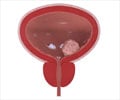In comparison to never smokers, former smokers had twice the risk of bladder cancer, and current smokers had more than three times the risk, revealed new study.

Author: Yueyao Li, MSPH, MD, a PhD candidate in the Department of Epidemiology and Biostatistics, School of Public Health, Indiana University in Bloomington.
Background: Although bladder cancer is a fairly rare cancer type, representing an estimated 4.6 percent of new cancer cases in 2019, "it is the most common malignancy of the urinary system, with high recurrence rate and significant mortality," Li said.
"Smoking is a well-established risk factor for bladder cancer, but findings on the relationship between duration of smoking cessation and the reduction in bladder cancer risk are inconsistent," Li continued.
She added that while bladder cancer is more common in men, women often have worse outcomes, even when diagnosed at similar stages.
In this study, Li and colleagues sought to analyze the dose-response relationship between time since quitting smoking and risk of bladder cancer among postmenopausal women, and to investigate whether risk among former smokers ever normalized to the risk faced by those who never smoked.
Advertisement
Results: As of Feb. 28, 2017, the researchers had identified 870 cases of bladder cancer. The study showed that, in comparison to never smokers, former smokers had twice the risk of bladder cancer, and current smokers had more than three times the risk.
Advertisement
However, in time-updated models that reflected those who stopped smoking during the study period, the researchers found that compared with women who continued to smoke, those who quit smoking during the follow-up years had a 39 percent decrease in bladder cancer risk, and the risk continued to decline over time.
Author's Comments: Li said that while the biological mechanisms of the association between bladder cancer and smoking are not known, the study results indicate that women of any age should be discouraged from smoking, and even those who have smoked for many years stand to benefit from quitting.
"Our study emphasizes the importance of primary prevention (by not beginning to smoke) and secondary prevention (through smoking cessation) in the prevention of bladder cancer among postmenopausal women," Li said.
Study Limitations: Li cautioned that the study was based on postmenopausal women, so results may not be fully generalizable. Also, exposure to smoking was self-reported.
Funding & Disclosures: This study was funded by the National Heart, Lung, and Blood Institute, the National Institutes of Health, and the U.S. Department of Health and Human Services. Li declares no conflicts of interest.
Source-Eurekalert















